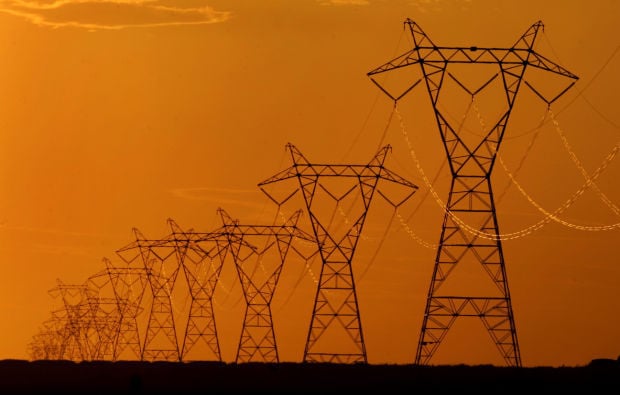A proposed settlement filed in Trico Electric Cooperative’s pending rate case would add an estimated $2 per month to the average home bill, by boosting its basic monthly charges 60 percent to $24 while lowering usage-based energy charges.
The proposal by Trico and the staff of the Arizona Corporation Commission would also cut the rate at which customers with new rooftop solar-energy systems are reimbursed for the excess power their systems produce.
The settlement also would add to all residential and small-business customer bills a so-called “demand rate” — based on the customer’s highest monthly usage — though the rate for that charge would be zero.
The Arizona Corporation Commission will hold a meeting Tuesday in Tucson to gather public comment on the proposed Trico settlement, which the full Corporation Commission is expected to consider for approval in August. No other parties to the case have signed onto the settlement.
Trico is a nonprofit, member-owned corporation providing electric service to about 40,000 customers in rural areas of Pima, Pinal and Santa Cruz counties. The co-op last had a rate increase in 2009, when rates went up an an average of 6.6 percent.
The increase Trico is requesting amounts to an annual revenue increase of about $2.3 million, or about 2.6 percent, and a $2.05, or 1.75 percent, increase in the typical home customer’s monthly bill.
Trico CEO Vin Nitido said the increase is needed to make up for costs that have risen since the last rate case, which was based on 2007 cost figures.
Nitido said the revenue shortfall is almost entirely due to customers with rooftop solar installations, who because they generate most or all of their electricity don’t pay for the fixed costs of energy, such as transmission and distribution, that are included in charges for each kilowatt-hour of energy used.
Trico figures those roughly 1,500 solar customers cost the company, and in turn other non-solar customers, about $80 per month in unrecovered fixed costs, or about $2 million a year.
Under the settlement, Trico is proposing to cut the net-metering rate, at which solar customers are reimbursed for excess power production, from the current full retail rate of about 12 cents per kilowatt hour to 7.7 cents per kWh. The new rate would apply to customers whose solar systems were approved for connection by the end of last May.
The lower reimbursement rate would reduce the estimated average subsidy of solar customers to about $60 per month, Nitido said.
“We think that’s a reasonable approach, given that we’ve been seen a huge influx in applications, and it’s a number we thought made sense and would continue to promote solar while mitigating the cost shift,” Nitido said.
The electric co-op also wants approval to adjust that rate within 18 months, without having to file a whole new rate case, based on an ongoing Corporation Commission study of the value of rooftop solar.
During contentious hearings in that study case, utilities have argued that solar is worth little more than the avoided cost of fuel, citing extra grid costs, while solar advocates say it’s worth as much or more than traditional generating resources especially when factoring in societal benefits such as reduced air pollution.
The idea behind the zero demand charge is to give customers information about how their bills would look with demand charges, Nitido said. “It gives us time to educate folks on how to manage their own (power) loads to minimize their bills,” he said.
But though demand charges are common for commercial accounts, they have never been mandated for residential customers in Arizona.
And when UNS Electric proposed a mandatory, across-the-board demand-charge rate for home and small business customers — at the urging of the Corporation Commission staff — it touched off a storm of opposition.
UNS later backed off its support of the across-the-board demand-charge plan but still wants to force newer rooftop solar customers onto a demand rate. That case is expected to go before the full commission in the next month or so.
A solar-industry representative said the Trico proposal for a demand charge is surprising, though the rate is set at zero, given the outpouring of opposition from ratepayers and consumer advocates in the UNS case.
“The idea of a zero-dollar demand charge is too cute by way more than half,” said Court Rich, a Phoenix attorney representing the Energy Freedom Coalition of America. “It’s not going to educate consumers at all, it’s just the camel’s nose under the tent.”
Consumer advocates have opposed residential demand charges, contending that customers would have trouble understanding their impact.
Trico’s request for a higher fixed monthly charge is part of a trend of utilities looking to collect more of their fixed costs such as transmission from fixed charges, rather than usage-based rates.
In its pending rate request, Tucson Electric Power has proposed doubling the fixed monthly residential customer charge to $20 from $10 currently. UNS is seeking to hike its basic charge to $15 from $10 currently.
At $24, Trico’s monthly basic service charge would be among the highest in the state.
Consumer advocates including AARP say higher basic monthly charges create an unfair burden on poorer customers because it lessens their ability to control their bills through conservation.





